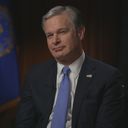Retiring FBI chief: Critics claim to like "independence and objectivity" until it hurts them
Retiring FBI Director Christopher Wray said in a "60 Minutes" interview airing Sunday that he's retiring early because he didn't want to thrust the Bureau "deeper into the fray" after facing intense criticism from President-elect Trump.
Why it matters: Trump nominated Wray in 2017 for what's typically a 10-year term, but the FBI chief has in recent years faced intense criticism from the Republican leader and his allies over issues related to Trump and President Biden.
- During the interview, Wray addressed being criticized over FBI investigations by both Trump and Biden.
Context: The president said after issuing a presidential pardon for his son Hunter Biden following his conviction on felony gun charges and guilty plea on felony tax charges that he believed "raw politics has infected this process and it led to a miscarriage of justice."
What he's saying: "This is a hard job. You're inevitably going to make different people angry, often very powerful people," Wray said during his "60 Minutes interview.
- "But part of the essence of the rule of law is to make sure that facts, and the law, and proper predication drive investigations, not who's in power, not who wants it to be so or not so," he told CBS' Scott Pelley.
- On his relationship with Trump souring after the FBI investigated alleged attempts to overturn the 2020 election results, Wray said the FBI's job as investigators was to "follow the facts wherever they lead, no matter who likes it."
Zoom in: On the classified documents investigation for which he drew criticism from Trump and his allies for the FBI searching the Republican leader's Mar-a-Lago home, Wray said the FBI tried to follow those rules throughout and he believed they did this.
- He said a search warrant is "not anybody's first choice" and they always try less intrusive means. First, they try to get the information back voluntarily, then with a subpoena.
- "Only if, after all that, we learn that the agents haven't been given all of the classified material and in fact those efforts have been frustrated, even obstructed, then our agents are left with no choice but to go to a federal judge, make a probable cause showing, and get a search warrant," Wray said.
- "That's what happened here," added Wray, who described himself during his interview as a "conservative Republican."
The bottom line: Wray said that in his 7.5 years of experience as FBI chief he'd seen "people often claim to be very interested in independence and objectivity until independence and objectivity lead to an outcome they don't like."
- He added: "Truth is truth, not necessarily what either side wants it to be. And ultimately all we can do at the FBI is make sure that we stay focused on doing the work in the right way. Following our rules and not letting preferences, partisan or otherwise drive or taint the approach."
Threat level: Wray told Pelley that China's government targeting U.S. civilian critical infrastructure was the biggest threat the incoming Trump administration faced.
- "Things like water treatment plants. We're talking about transportation systems. We're talking about targeting of our energy sector, the electric grid, natural gas pipelines," he said.
- "And recently we've seen targeting of our telecommunications systems. … we believe that they have collected their content, the actual communications of those people."
Meanwhile, "the most challenging type of terrorist threat we face" is online radicalization from extremist groups.
- Wray noted that the FBI's investigation into the New Orleans New Year's Day terrorist attack indicates at this stage that the suspect was "radicalized online" and he "appears to have been inspired — from afar — by ISIS."
Flashback: House GOP drops plan to hold FBI director in contempt
Editor's note: This a breaking news story. Please check back for updates.

